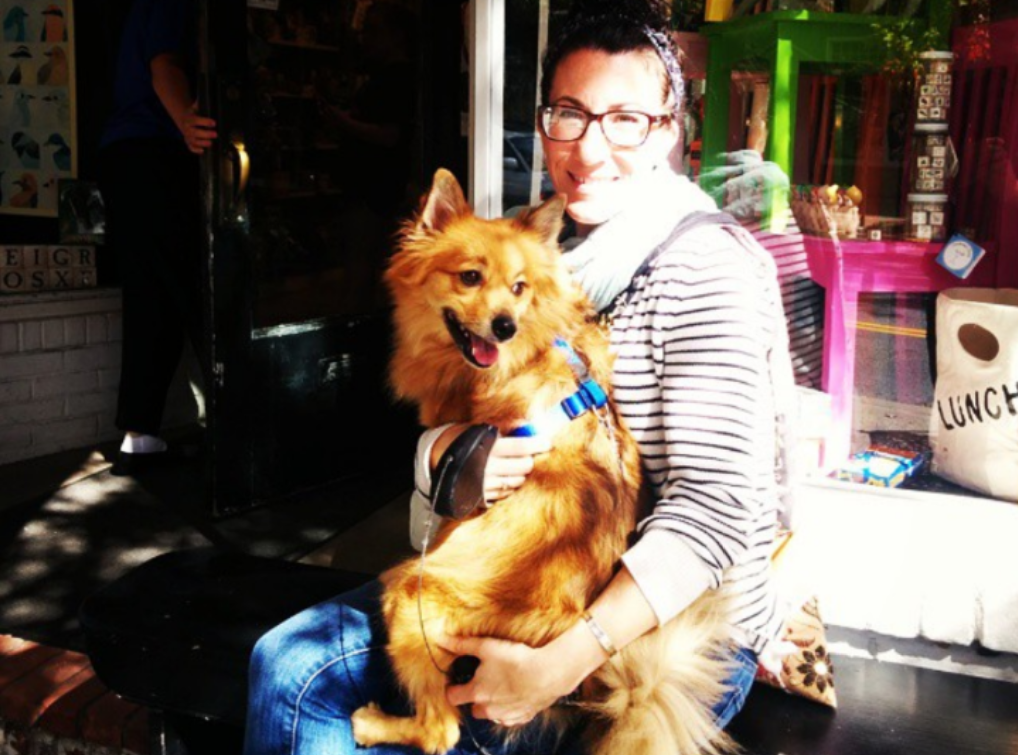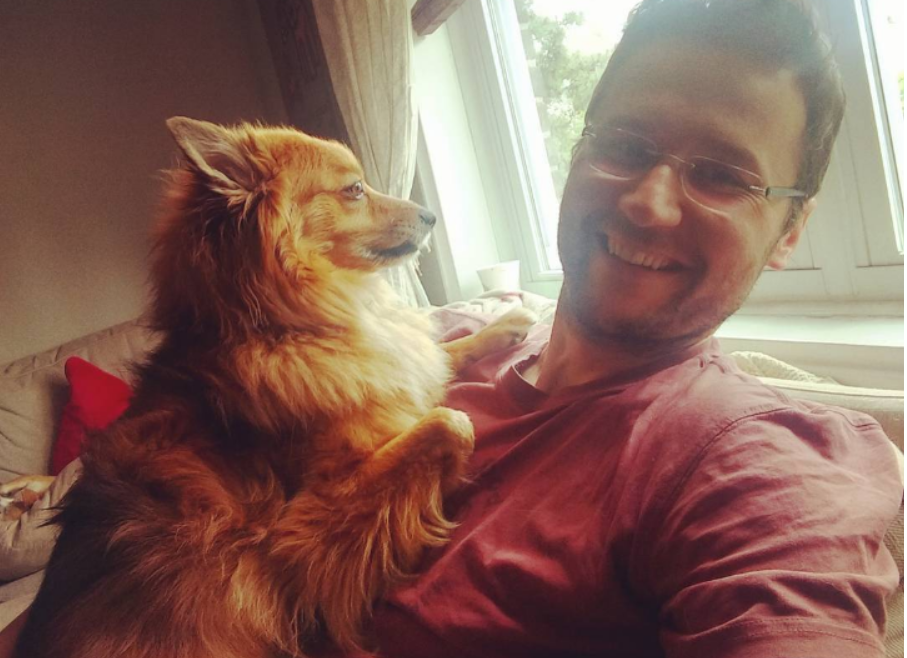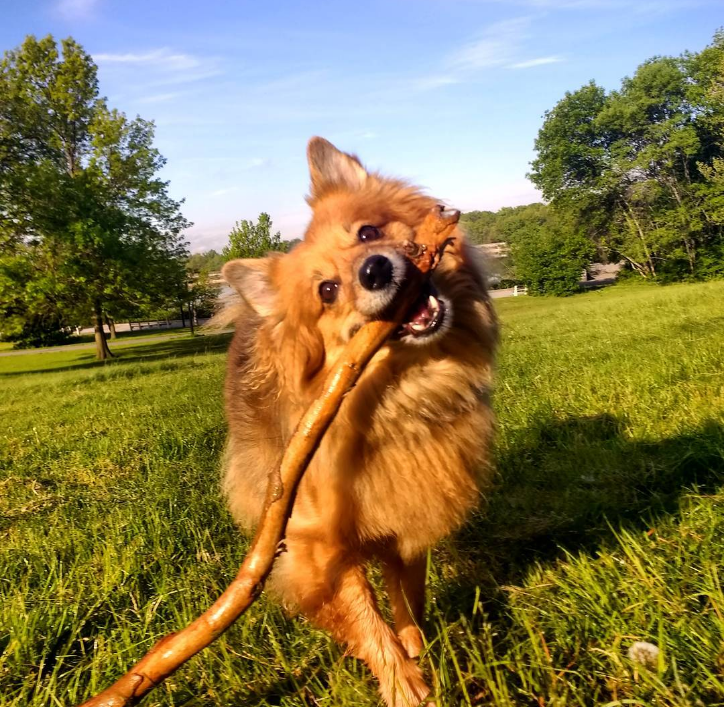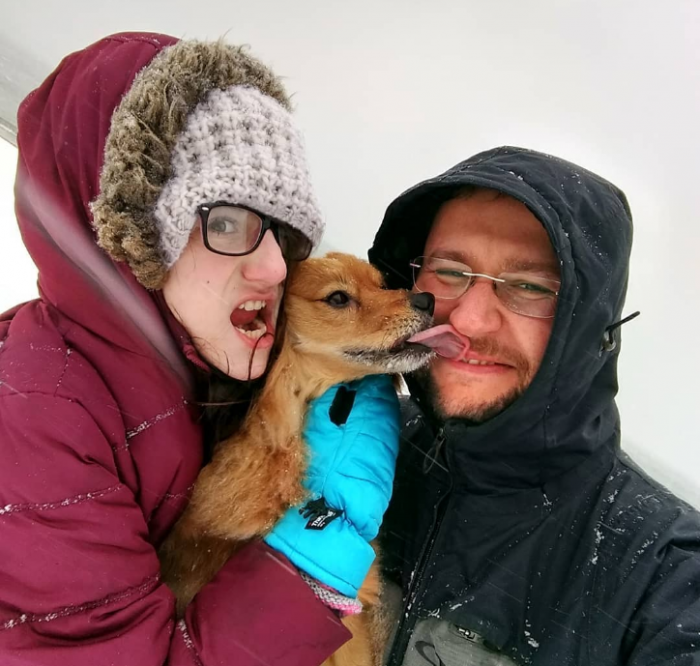I picked up Paco’s ashes on an unusually sunny day in early April.
The day was dressed in the kind of weather that made me want to switch to iced coffee after a long winter of hot lattes. It had me thinking about starting a running habit of dreaming about summer at the beach—of a day-long golden hour. It was the kind of weather that spoke of possibilities. It was also the first day in almost two weeks that didn’t begin with me crying.
I was walking out of my job in a middle school in NYC when I felt my phone vibrate against my leg. As I ran down the stairs, I reached into my back pocket and saw that recognizable New Jersey phone number displayed. It was the third time since January. I didn’t answer the call, instead let it go to voicemail, letting the person on the other side drop the words into the air—I wasn’t ready to hear them.
By the time I got to my car, I felt the other vibration, the one notifying me of a new message. I opened the car door, slid in, and sat there, not starting the car, not putting my seatbelt on, not turning my visor down, and not raising my hand to wave to my coworker, entering the car parked next to mine. I just sat there, sinking in all the “nots.”
I squeezed my eyes shut to hold in the tears, entered the pin number into my phone, and pressed play on the new recording. The receptionist’s voice came through, telling me that I could come to pick up my boy.
We adopted Paco in September of 2011. I was still drinking and reeling from the death of my other dog, Cisco. The months leading up to that day were extremely dark.
Have you ever visited a cavern? That’s what my insides felt like, damp and freezing cold, and nowhere anyone would want to be for an extended period of time. I just wasn’t myself. It’s hard to describe having a hole, but at the same time having it filled, just with all the wrong things—pain, hopelessness, failure, and shame.
In recovery, the idea of “the hole” is a recurring theme. Addiction specialists talk about this emptiness that addicts feel, and the use of drugs and alcohol to fill the void. And how, ironically, what it really does is widen the gap inside until you’re just a shell.
There is a poem called “The Hole in My Sidewalk,” by Portia Nelson, that makes its way into recovery groups online if you stick around long enough. It describes, in five extremely short stanzas (that she calls “chapters”) a person walking down a street and falling into a hole. They claw their way out several times before they finally first decide to go around it, and then ultimately take another street, all to avoid this hole.
It’s supposed to be symbolic of the road of addiction and recovery with the general consensus of the reader that the character is triumphant in the end, but all I can think is that the damn hole is still there, you’re just on another street.

I wish you could’ve met Paco.
He was carefree and playful and delighted in walks and car rides and snow and peanut butter. He was a people “person.” Passersby stopped for him, our little fox with his pointy ears and orange and black tinged fur and fluffy tail.
We learned that his history included being left behind in an apartment for days after his owner(s) were evicted. A neighbor had heard his incessant barking and called the police, and from there, he landed in a shelter, then got picked up by a rescue.
I found him on the internet, YouTube specifically, on a dark night of the soul that I spent drowning the pain of my losses. There was a joyous video of him playing with a stuffed hamburger with one of the rescue volunteers. “Strut,” by Adam Lambert, accompanied the video in the background.
When he first came home to us, I scoured the web trying to find out who these people were who left him alone like that, using what little information his paperwork offered. What horrible human beings they must be. Vacuous and empty, they must have holes in their hearts. I don’t know what I would’ve done if I discovered who they were. I think I just wanted to match the face to the abandonment. I wanted to see a justifiable reason in their eyes, but I never did get that chance.
That March, I got sober and I felt so much pride in knowing that this special creature would not see me drunk or hungover. I wouldn’t stumble while walking him around the neighborhood. I wouldn’t forget to feed him or be too tired to take him out in the morning. I saw a quote once that said, “Be the person your dog thinks you are,” and it guided me. There are many reasons people get sober and yes, for me, my dog was one of them.
My husband, Chris, loved Paco so much. He would jokingly whisper in his ear, “Mama found you on the Internet!” before rustling his hair and throwing the ball to him for the millionth time. He took Paco with him on hikes. They would come home, both of them tired and thirsty, and Chris would meticulously comb his fur for ticks before they would plop down for the remainder of the day. These were the times I loved, my husband in his comfy chair and Paco at my feet, both content. They had a language together in nature that I didn’t understand, but it wasn’t meant for me, and that was okay.
Paco could sense when he was about to go in the car, and he would immediately start barking and prance around the house and run to the front door, eagerly and impatiently waiting. Then, once let out, he’d race to the driver side door, sniffing and jumping to be let in. I wondered if he, too, had buried fears, his of being left again.
Chris took him on trips to the local coffee shop for “Pacocchinos.” He let his leash out on extra long walks so he could explore the world and scents around him. He brushed his hair, careful to get all the knots out of his long tail. He bought him treats and snuggled with him on Sunday mornings. Paco loved him right back—it was apparent that he chose my husband as his person.

The signs introduced themselves to us the week before Christmas in 2019. We came home from a dinner out, and he was vomiting uncontrollably and without end in sight. Chris rushed him to a 24-hour vet and a slew of tests ensued without answers.
One afternoon, a week before he left us, he lunged for a piece of chicken that had fallen on the floor and caught my husband’s hand in the process. He broke skin. It was a bad bite, and it scared us. We didn’t understand what was happening to our pup. We started worrying we’d have to put him down.
My husband sprang into action, researching everything that could be wrong with him, preparing healthy meals, and trying holistic approaches to this new, aggressive behavior Paco was demonstrating, especially around food, coupled with an obvious uneasiness that showed up in pacing and panting at night.
We had a child and four other pets at home and we were cautioned about their safety. We sat our daughter down, and talked about eating at the table and being careful with snacks, and how if she dropped something on the floor, to just let Paco have it. At night, I was vigilant, watching him with the other pets.
I went about my daily routine like things were normal, but inside I was dismayed. It felt like we were taking a turn down the wrong street. I didn’t even want to talk about him with friends because all I could offer to explain about Paco was that he just wasn’t himself. We saw four different vets over the course of those three months. A brain tumor was really only mentioned once or twice, so we went around it and tried to push the possibility out of our heads, but in the end, we couldn’t make it go away.
Paco suffered a seizure on March 22 this year, and never recovered, and I found myself back in that cavern with my husband right alongside me.
Recovery has been a weird thing for me. It’s been seven years and I rarely crave a drink, but I haven’t created a new life for myself either. I still have the same job and friends. I haven’t embraced yoga or running or any type of exercise routine. I still feel like I need to sit and think and keep to myself for just a little bit longer. The 25 years of heavy drinking I did is still unraveling inside me.
I honor my loss by staying sober. It would be a disservice to my feelings, and to those, I’ve loved and lost if I were to drink to excess to numb out my pain.
I start my car and wipe away my tears, reverse out of my spot, and exit the parking lot. I get on the highway and head to New Jersey. I want to get my dog’s ashes. I want to bring him home. I think about calling a friend to go with me. I think about calling Chris and telling him I’m getting Paco, but he’s at work and I’m afraid to upset him. So I just go.
There is no traffic, and I open the windows to feel the sun and the breeze of this idyllic day. I practice telling the receptionist that I’m there to pick up my dog’s ashes. I repeat it until I can say it without crying. I enter the vet’s office and the only person there is the woman at the desk. I tell her why I’ve come and she hands me a large, purple paper shopping bag from a shelf with 17 other purple shopping bags (I counted).
I walk out carrying the bag and think about the people driving past me in their cars or walking down the street. To them, I might look like I just went shopping. No one would ever guess what I had inside. I carry it purposely and carefully to my car and get inside and head home, the dog-shaped hole in my heart leading the way.
~

~








Read 9 comments and reply